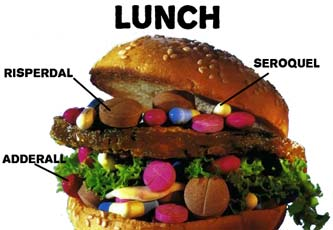European Medicines Agency finalises review of antidepressants in children / adolescents
European Medicines Agency finalises review of antidepressants in children / adolescents
Tue, 26 Apr 2005
The European Medicines Agency (EMA) has issued a press release recommending warnings about the increased risk of suicide attempts and hostility for children and adolescents prescribed an SSRI or SNRI antidepressant –and added warnings about the increased risk of hostility and “emotional lability” for children prescribed Strattera (atomoxetine).
These warnings are based on a scientific review of the evidence by the EMA’s Committee for Medicinal Products for Human Use (CHMP), which concluded that the warnings about increased risk of suicide attempts and hostility should be included in the product information of all antidepressants:
“…a warning reflecting the increased risk of side-effects such as suicide attempt, suicidal thoughts and hostility (predominantly aggression, oppositional behaviour and anger) in children and adolescents treated with antidepressants should be included in the product information of citalopram, escitalopram, fluoxetine, fluvoxamine, mianserine, milnacipran, mirtazapine, paroxetine, reboxetine, sertraline and venlafaxine containing medicinal products to warn physicians, patients and parents regarding this signal”.
The justification for the inclusion of atomoxetine (Strattera) is the finding that the drug increased risk of hostility and emotional lability:
“No signal of suicide related behaviour was seen in atomoxetine studies. However, the Committee concluded that a warning reflecting the increased risk of side-effects such as hostility and emotional lability and a warning indicating the lack of efficacy in depression should be included in the product information of atomoxetine, which is only indicated in the treatment of ADHD.”
Contact: Vera Hassner Sharav
212-595-8974
http://www.pharmalive.com/News/index.cfm?articleid=232445&categoryid=10#
http://www.emea.eu.int/pdfs/human/press/pr/12891805en.pdf
European Medicines Agency Finalises Review of Antidepressants in Children Adolescents
LONDON, April 25, 2005 – The European Medicines Agency has completed its review of two classes of antidepressants and concluded that they should not be used in children and adolescents except in their approved indications.
The review of serotonin-selective reuptake inhibitor (SSRI) and serotonin-norepinephrine reuptake inhibitor (SNRI) medicines looked at the potential risk of suicidal behaviour in children and adolescents treated with these products.
The Agency’s scientific committee, the Committee for Medicinal Products for Human Use (CHMP), concluded at its 19-22 April 2005 meeting that suicide-related behaviour (suicide attempt and suicidal thoughts), and hostility (predominantly aggression, oppositional behaviour and anger) were more frequently observed in clinical trials among children and adolescents treated with these antidepressants compared to those treated with placebo.
The Agency’s committee is therefore recommending the inclusion of strong warnings across the whole of the European Union to doctors and parents about these risks. Doctors and parents will also be advised that these products should not be used in children and adolescents except in their approved indications.
Most of these products are approved for the treatment of depression and anxiety in adults in the European Union, but are not licensed Europe-wide for the treatment of these conditions in children or adolescents. Some of these products are however licensed for paediatric use for the treatment of obsessive-compulsive disorder and one of them for the treatment of attention deficit/hyperactivity disorder.
It is recognised that a doctor may sometimes take a decision based on the individual clinical needs of a child or an adolescent to use these products for the treatment of depression or anxiety. The CHMP is recommending that in these cases patients be monitored carefully for the appearance of suicidal behaviour, self-harm or hostility, particularly at the beginning of treatment.
The CHMP also stresses the following:
- Treatment should not be stopped by the patient or the parents without first seeking medical advice from the treating doctor, because there is a risk of experiencing withdrawal symptoms, such as dizziness, sleep problems and anxiety if discontinuation is abrupt.
- When treatment is being stopped, it is recommended to gradually reduce the dose over several weeks or months.
- Patients or parents who have any concerns about the medication are advised to consult the treating doctor at the next available opportunity to discuss treatment options and support.
A question and answer document is annexed to this press release.
NOTES:
1. The review looked at the medicines containing the following substances: atomoxatine, citalopram, duloxetine, escitalopram, fluoxetine, fluvoxamine, mianserine, milnacepran, mirtazapine, paroxetine, reboxetine, sertraline and venlafaxine.
2. A previous statement was issued by the European Medicines Agency on 9 December 2004 and is available here.
3. The review was initiated at the request of the European Commission on 17 December 2004. The legal basis for the review is Article 31 of the Community code on medicines for human use for all substances except duloxetine, for which the legal basis is Article 18 of Council Regulation (EEC) No 2309/93.
4. This press release, together with other information on the work of the EMEA, can be found on the EMEA website at http://www.emea.eu.int Media enquiries only please to:
Martin Harvey
Tel. (44-20) 74 18 84 27
Questions & Answers on SSRIs-SNRIs
1. What are SSRIs and SNRIs?
SSRIs and SNRIs are medicines for the treatment of conditions such as depression and anxiety. They affect the transmission of chemical messages in the brain and nervous system.
SSRI stands for ‘Serotonin-Selective Reuptake Inhibitor’.
SNRI stands for ‘Serotonin-Norepinephrine Reuptake Inhibitor’.
The CHMP reviewed the following SSRIs/SNRIs: atomoxetine, citalopram, duloxetine, escitalopram, fluoxetine, fluvoxamine, mianserine, milnacipran, mirtazapine, paroxetine, reboxetine, sertraline and venlafaxine; clinical trial data in children and adolescents were available for most of these medicines.
Some of these medicines are authorised for the treatment of obsessive-compulsive disorder (OCD) and the treatment of attention deficit/hyperactivity disorder (ADHD) in children and adolescents.
These medicines, however, are not authorised EU-wide for the treatment of depression and anxiety disorders in children or adolescents. Nevertheless, a decision may sometimes be taken by the physician, based on clinical necessity, to treat such patients.
2. Why did the EMEA/ CHMP review these products?
Due to emerging data from clinical trials in SSRIs and SNRIs in children and adolescents showing an increased risk of suicidal behaviour, the European Commission requested the CHMP to review the safety of these products and to give an opinion on whether regulatory action was warranted.
3. What evidence has the CHMP reviewed?
The CHMP reviewed all the data available to the National Authorities in the EU and data submitted by MAHs of these antidepressants in children and adolescents. These data included clinical trials that were submitted to regulatory authorities by the companies, data published in scientific journals, and observational studies (epidemiology).
The EMEA/CHMP also convened a meeting of an ad-hoc expert group, which included EU child psychiatrists, in order to provide advice on the safe use of these medicines.
4. What are the recommendations from the CHMP?
Based on the data reviewed, the CHMP concluded that a warning reflecting the increased risk of side-effects such as suicide attempt, suicidal thoughts and hostility (predominantly aggression, oppositional behaviour and anger) in children and adolescents treated with antidepressants should be included in the product information of citalopram, escitalopram, fluoxetine, fluvoxamine, mianserine, milnacipran, mirtazapine, paroxetine, reboxetine, sertraline and venlafaxine containing medicinal products to warn physicians, patients and parents regarding this signal.
No signal of suicide related behaviour was seen in atomoxetine studies. However, the Committee concluded that a warning reflecting the increased risk of side-effects such as hostility and emotional lability and a warning indicating the lack of efficacy in depression should be included in the product information of atomoxetine, which is only indicated in the treatment of ADHD.
There were no deaths due to suicide reported in the clinical trials conducted in children and adolescents with these products.
5. Do SSRIs/SNRIs increase suicide risk in children and adolescents?
In the clinical studies on children and adolescents reviewed by the CHMP there were no reports of death due to suicide. However, data from these studies showed that children and adolescents were more prone to suicidal thoughts and behaviour when taking SSRIs or SNRIs, particularly if they suffer from underlying depression.
6. My child is already taking an SSRI or SNRI. What should I do?
The treatment should not be stopped without first seeking medical advice. Stopping treatment suddenly could lead to withdrawal symptoms, sometimes severe. They may include dizziness, sleep problems and anxiety. If you are concerned about your child’s treatment you should consult the treating doctor, who is best placed to advise on further management of your child.
7. What is the advice for health care professionals?
SSRIs/SNRIs should not be used in the treatment of children and adolescents unless specifically authorised. Suicide-related behaviours (suicide attempt and suicidal thoughts), and hostility (predominantly aggression, oppositional behaviour and anger) were more frequently observed in clinical trials among children and adolescents treated with antidepressants compared to those treated with placebo. Nevertheless, if based on an individual clinical need a decision to treat is taken by the physician, the patient should be carefully monitored for the appearance of suicidal behaviour, self-harm or hostility, particularly at the beginning of treatment


